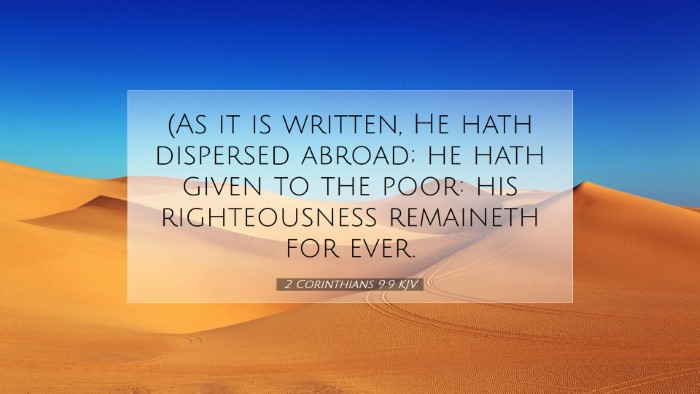Old Testament
Genesis Exodus Leviticus Numbers Deuteronomy Joshua Judges Ruth 1 Samuel 2 Samuel 1 Kings 2 Kings 1 Chronicles 2 Chronicles Ezra Nehemiah Esther Job Psalms Proverbs Ecclesiastes Song of Solomon Isaiah Jeremiah Lamentations Ezekiel Daniel Hosea Joel Amos Obadiah Jonah Micah Nahum Habakkuk Zephaniah Haggai Zechariah Malachi2 Corinthians 9:9
2 Corinthians 9:9 KJV
(As it is written, He hath dispersed abroad; he hath given to the poor: his righteousness remaineth for ever.
2 Corinthians 9:9 Bible Commentary
Commentary on 2 Corinthians 9:9
Verse: "As it is written, He hath dispersed abroad; he hath given to the poor: his righteousness remaineth for ever."
Historical Context
The Apostle Paul, in his second letter to the Corinthians, addresses the concept of generosity and giving among believers. This verse is a part of a larger discourse on the importance of supporting the impoverished and the significance of generosity in the life of a Christian. Paul is encouraging the Corinthians to complete their collection for the saints in Jerusalem, emphasizing that their generosity will reflect their faith and align with God's character, as shown throughout scripture.
Exegesis and Interpretation
In this passage, Paul cites Psalms 112:9 which speaks of a righteous person who is characterized by their liberality and concern for the poor. Progressive revelation of God's character as a generous giver is significant; thus, to imitate God implies adopting His attributes, including generosity.
- Divine Example of Generosity: Paul uses the reference to underline that true righteousness manifests itself through generosity. Just as God gives to the needy, believers are called to mirror that divine act.
- The Eternal Nature of Righteousness: The righteousness spoken of here is not merely a transient quality but an enduring state that reflects God's eternal nature. This encourages believers that their acts of giving do not go unnoticed by God.
Theological Significance
The implications of this verse extend beyond mere financial contributions; instead, it encompasses a holistic approach to generosity that is deeply rooted in moral and spiritual righteousness. The call to give arises from a place of understanding one's position in Christ, leading to a transformed view of material possessions.- Reflection of God’s Kingdom: Engaging in acts of kindness and generosity symbolizes the values of God’s Kingdom, paving the way for the earth to reflect Heaven's reality.
- Societal Impact: Paul’s exhortation highlights the impact of Christian generosity on society, where concern for the poor aligns community practices with the teachings of Christ and fosters an environment of mutual support.
Insights from Public Domain Commentaries
Matthew Henry: In his commentary, Henry emphasizes the practical aspect of this verse, noting that true righteousness is seen in the way a believer manages their resources. He articulates that charitable acts are not only beneficial to those who receive but are also a source of spiritual growth and blessing for the giver.
Albert Barnes: Barnes notes that the act of giving to the poor is not just a philanthropic expedition but one deeply intertwined with the Christian faith. He posits that such acts signify a believer’s obedience to God’s commands, reinforcing their reliance on divine provision rather than earthly wealth.
Adam Clarke: Clarke elaborates on the notion of righteousness remaining forever. He suggests that the implications of generosity extend into eternity, highlighting that the rewards of such acts transcend worldly measures. Generosity, according to Clarke, demonstrates faith in God’s provision and a right attitude towards earthly treasures.
Practical Applications
In the contemporary context, 2 Corinthians 9:9 calls for introspection on how believers interact with their resources. Pastors, students, and scholars can apply the following principles in their lives:
- Sacrificial Giving: Consider how one can give beyond typical offerings, reflecting a desire to help those in need in meaningful ways.
- Teach Generosity: Church leaders should address the importance of generosity in sermons and curricula to foster a culture of giving among congregants.
- Encourage Community Support: Facilitate programs that promote collective giving and support for local community needs, creating a robust network of care among believers.
Conclusion
Ultimately, 2 Corinthians 9:9 serves as a clarion call to a lifestyle characterized by generosity that reflects God’s generosity towards humanity. The integration of this principle into the life of the believer signifies a deeper understanding of God’s grace and righteousness. As believers practice generosity, they mirror the attributes of their Heavenly Father and lay up treasures in Heaven, thus cultivating a richer, more fulfilling faith journey.


